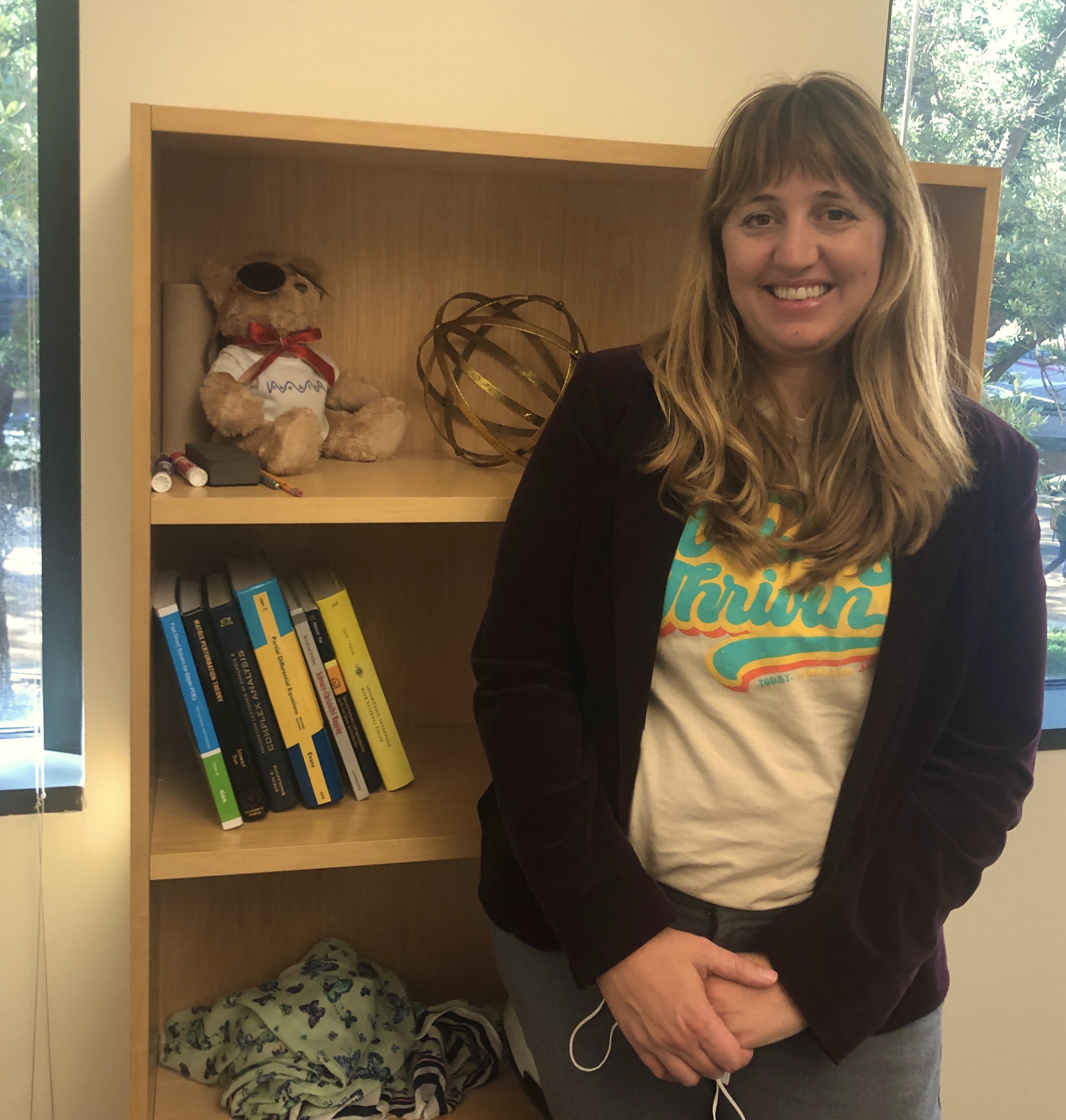Heather Wilber, an NSF postdoctoral fellow in the Department of Mathematics who joined the Oden Institute in May 2021, received the 2022 Association of Women in Mathematics (AWM) Dissertation Prize for a study entitled, Computing numerically with rational functions. Although only published earlier this year, it has resulted in multiple papers in scientific journals already, appearing in the SIAM Journal of Scientific Computing, Linear Algebra and its Applications, and Constructive Approximation (to appear).
The work by Wilber, who completed her Ph.D. in Applied Mathematics at Cornell University, was described by one commentator as a "beautifully written dissertation."
Surely a rare compliment for a mathematical thesis? Perhaps, but Wilber's road less traveled into applied mathematics actually began when she was contemplating getting an English degree at the University of Idaho.
"I wanted to be a poet," she said. "I tutored math as part of a work study placement for my degree. My options were limited to either working in a kitchen washing dishes or tutoring math. I was good at math in school. So I said, 'Okay, I'll tutor math.'"
Wilber found she enjoyed solving numerical problems. So much so that she took a niche undergraduate course colloquially referred to as math for poets. This led her further away from poetry while feeding her increased appetite for mathematics. "I found myself at a crossroads," she said.
From Idaho to Cornell
Upon graduation, Wilber completed a Master's in Applied Mathematics from Boise State University. "From there, I became very interested in numerical analysis and began working on a project with my advisor that involved collaborations with the 'Chebfun' research group at the University of Oxford."
Named after 19th century Russian mathematician, Pafnuty Chebyshev, the group introduced her to some new areas.
"I got to work on some cool scientific computing with problems on the surface of a sphere and on a disc. And I just kind of continued in that vein."
Wilber then completed her Ph.D. studying numerical analysis with Cornell's Dr. Alex Townsend.
She is now working with Dr. Per-Gunnar Martinsson, professor of mathematics in UT Austin's College of Natural Sciences and core faculty at the Oden Institute for Computational Engineering and Sciences. "He is well-known in many of the areas I'm interested in, particularly numerical analysis. I've wanted to work with him for a long time."
Wilber's current research involves problems at the interface of approximation theory, computational mathematics and scientific computing. The development and analysis of low rank approximation methods, direct solvers for partial differential equations, algorithms for solving linear matrix equations and evaluating functions of matrices, and robust algorithms for computing with rational approximations to functions, are also part of her numeric arsenal.
Her work will further inform and expand the capabilities of the mathematical tools underpinning computational science and engineering (CSE). "The math fascinates me more than any one application of CSE," she said. "The applications illuminate the math, or set up the problem for me, not the other way around."
Physics also provides the foundations for CSE as a discipline, and Wilber – the mathematician – has grown to appreciate the central role it plays. "Many of the problems I work on have foundations in electrostatics," she said. "I find using the ideas from this field to explain very pure math concepts an effective tool for visualizing what's happening within a mathematical framework. Suddenly I have pictures in my head of things like electrons scattering around and repelling from one-another. The physics helps inform the math."
Association of Women in Mathematics
As a recipient of the Association of Women in Mathematics Dissertation Prize for 2022, Wilber is honored just to be part of the same list as previous winners. "I am so impressed by the other women who have won the AWM dissertation prize, so happy to read about their work and so happy to be counted among them.
"The AWM is a crucial organization because they draw attention to the important mathematical and scientific strides being made by women. Historically, women, and especially women of color, have been shut out of institutions, and the contributions they have made have often been minimized or overlooked. It takes active and consistent work to repair and transform our institutions so that the door is no longer shut to women at any point along the road."
While Wilber says her own personal experiences as a woman in mathematics have been "mostly overwhelmingly positive," she has faced more than one glass ceiling.
"In addition to being a mathematician, I am a mother. I had my first child before I began graduate school and I decided to have the second one during the tail end of my Ph.D. This was not an easy decision because academia is not designed for people who are pregnant, or for people who are heavily involved in caretaking work. When I first applied to graduate school, faculty members – from some schools I did not end up attending – essentially told me as much," though she says Cornell was extremely supportive.
Heather Wilber is about to wrap up her first semester at UT Austin. And, it appears the interdisciplinary environment may have begun to pique new interests. "It's definitely useful, and grounding, for me to be in an environment like this with a lot of different people with different expertise. I can't just sit in my sandbox and do math. I have to consider whether what I'm doing is useful and where it might help other scientists, and I also get the chance to learn about beautiful new problems and ideas."
Written by John Holden and cross-posted from The Oden Institute.




















Comments